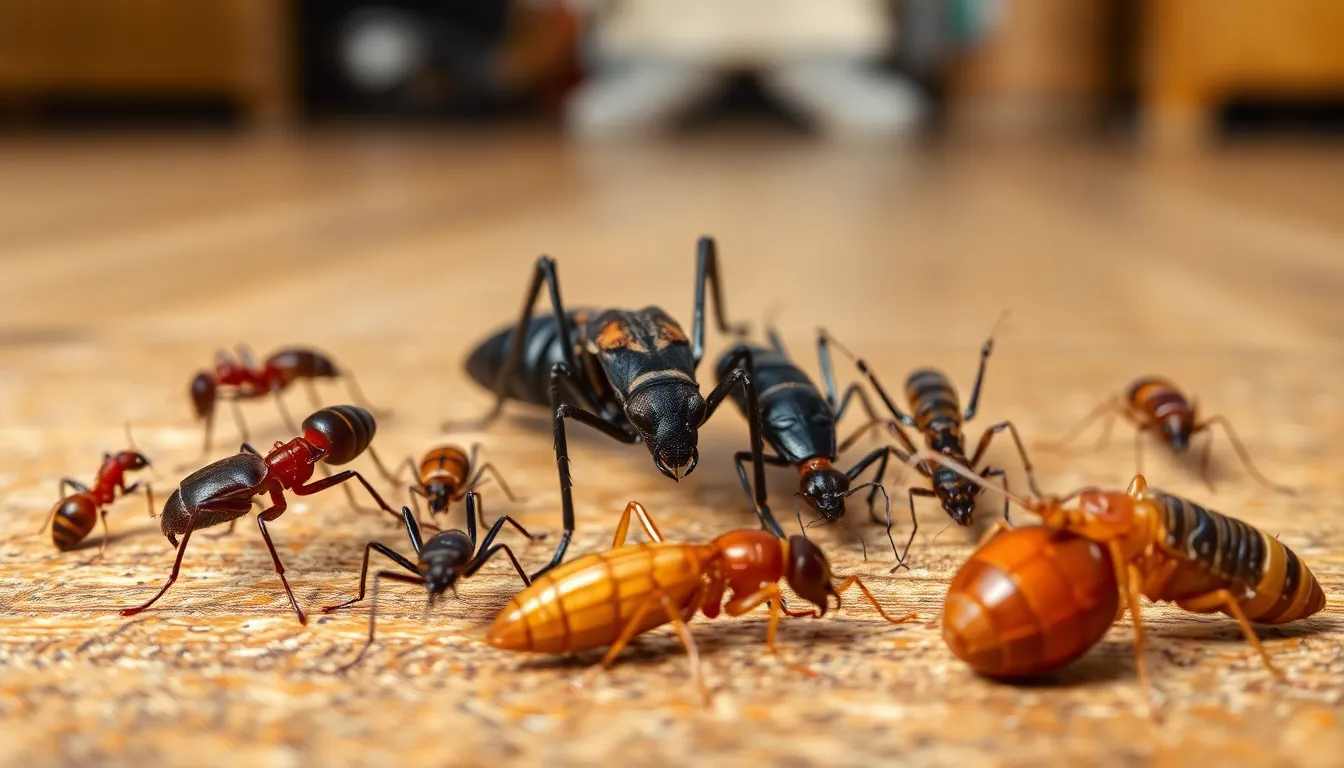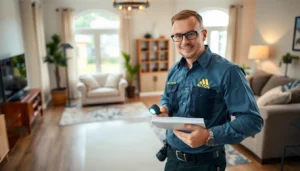Table of Contents
ToggleEvery homeowner knows the struggle: one moment, you’re enjoying a peaceful evening, and the next, an uninvited guest scuttles across the floor. Whether it’s ants throwing a party in the pantry or a mouse trying to sneak in for a late-night snack, pests can turn any home into a battleground. But fear not! With the right household pest solutions, you can reclaim your space and send those critters packing.
Overview of Household Pest Solutions
Effective pest solutions address various common household infestations, including ants, rodents, and termites. Understanding the types of pests present in a home is crucial for selecting appropriate treatment methods.
Integrated Pest Management emphasizes a combination of techniques for long-term control. This approach incorporates chemical treatments, physical barriers, and preventive measures like proper sanitation.
Chemical treatments include insecticides and rodenticides designed specifically for certain pests. Application requires caution to ensure safety for humans and pets while maximizing effectiveness.
Physical barriers serve as immediate deterrents. Examples include sealing entry points, using screens on windows, and installing traps. These measures can prevent further infestations and reduce the need for chemical treatments.
Preventive measures involve maintaining a clean home environment. Ensuring proper food storage, reducing clutter, and regular maintenance contribute to limiting pest attraction. Homeowners should frequently inspect their property for signs of pests, enabling early intervention.
Professional pest control services provide expertise and resources for severe infestations. Technicians can implement tailored solutions based on an assessment of pest types and the extent of infestation. They often use advanced techniques and advanced equipment unavailable to most homeowners.
Choosing the right pest solution depends on numerous factors such as the specific pest type, severity of the infestation, and homeowner preferences. It’s crucial for homeowners to stay informed about available options to manage pests effectively and reclaim their living spaces.
Common Household Pests

Households encounter various pests that disrupt comfort. Recognizing these pests is crucial for effective management.
Types of Household Pests
Ants, roaches, and rodents frequently invade homes. Termites are notorious for damaging wooden structures. Bed bugs cause sleepless nights for those who unknowingly host them. Flies, including fruit flies and houseflies, are common nuisances in kitchens. Each pest type demands specific attention for successful removal and prevention.
Impact of Household Pests
Pests pose health risks, potentially spreading diseases like salmonella or hantavirus. They can inflict property damage, particularly from termites and rodents, leading to costly repairs. Productivity may decline due to distractions caused by infestations. Mental well-being suffers when individuals feel uncomfortable in their own spaces. Addressing infestations promptly mitigates these impacts and restores peace.
Prevention Strategies
Effective prevention strategies help maintain a pest-free home environment. Homeowners can implement several practices to reduce the likelihood of infestations.
Proper Sanitation Practices
Proper sanitation practices play a crucial role in pest prevention. Regularly cleaning kitchen counters, floors, and dining areas removes food debris, a key attraction for pests. Storing food in sealed containers prevents access by insects and rodents. Taking out the trash frequently and using bins with tight-fitting lids keeps attractants out of reach. Additionally, treating spills and crumbs immediately prevents pests from being drawn to these easy food sources. Regularly cleaning behind appliances, such as refrigerators and stoves, further minimizes hiding spots for pests.
Home Maintenance Tips
Home maintenance tips ensure a secure environment against pests. Sealing cracks and crevices in walls and foundations stops entry points for rodents and insects. Installing door sweeps and window screens provides extra barriers against unwanted guests. Checking for leaks in plumbing minimizes moisture, which attracts pests like termites and cockroaches. Keeping gutters clean and directing water away from the foundation prevents moisture buildup and standing water. Regularly trimming shrubs and trees near the home eliminates conducive conditions for pest habitats.
DIY Pest Control Methods
Effective pest control can involve various do-it-yourself strategies. Homeowners often prefer methods that are simple and accessible.
Natural Solutions
Natural solutions often rely on everyday ingredients. Vinegar serves as an effective repellent against ants. Essential oils, like peppermint and tea tree, deter pests with their strong scents. Diatomaceous earth acts as a natural insecticide, damaging the exoskeletons of crawling insects. Garlic spray can repel a variety of critters, due to its potent aroma. Additionally, soap solutions naturally kill pests on contact, making it a versatile resource.
Chemical Solutions
Chemical solutions should be used with caution. Insecticides specifically designed for different pests offer quick results. Many contain active ingredients targeting specific species, such as pyrethroids for ants and roaches. Rodenticides address mouse and rat problems effectively but require careful placement to avoid risks to pets and children. Always follow application guidelines to ensure safety and efficacy. Choosing products labeled for indoor use enhances safety while addressing infestations promptly.
Professional Pest Control Services
Professional pest control services offer expertise in managing severe infestations that may overwhelm homeowners. Efficient and effective, these services utilize advanced techniques and industry-standard equipment for comprehensive pest management.
When to Call a Professional
Calling a professional becomes crucial in certain situations. Severe infestations of pests like termites or rodents often require specialized knowledge for accurate identification and treatment. Homeowners should also reach out for assistance if they cannot manage the problem with DIY methods. Signs of property damage, such as chewed wires or droppings, indicate an urgent need for professional intervention. Additionally, health concerns caused by pests, like allergic reactions or disease transmission, necessitate immediate action from experts.
Choosing the Right Service
Selecting the right pest control service involves evaluating several factors. Begin by researching local providers and reviewing customer testimonials to gauge satisfaction levels. Services should exhibit certification and licenses that demonstrate their credibility. Consider the variety of treatment options offered, as integrated pest management ensures a comprehensive approach to pest control. Additionally, inquire about their safety practices, particularly regarding the safety of pets and children. Requesting a thorough inspection before hiring helps in understanding the specific needs of a home and arriving at tailored solutions.
Addressing household pests is crucial for maintaining a healthy and comfortable living environment. By understanding the types of pests and implementing effective solutions homeowners can significantly reduce the risk of infestations.
Whether opting for DIY methods or seeking professional help tailored to specific needs it’s essential to stay proactive. Regular maintenance and sanitation practices play a vital role in prevention.
With the right approach homeowners can reclaim their spaces and enjoy peace of mind knowing their homes are pest-free.




